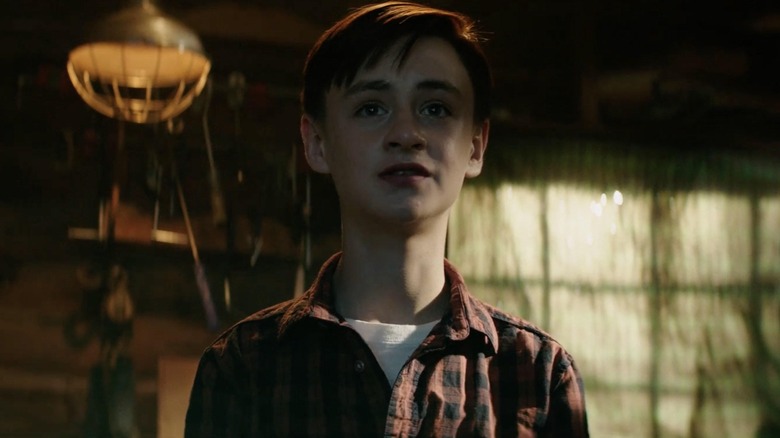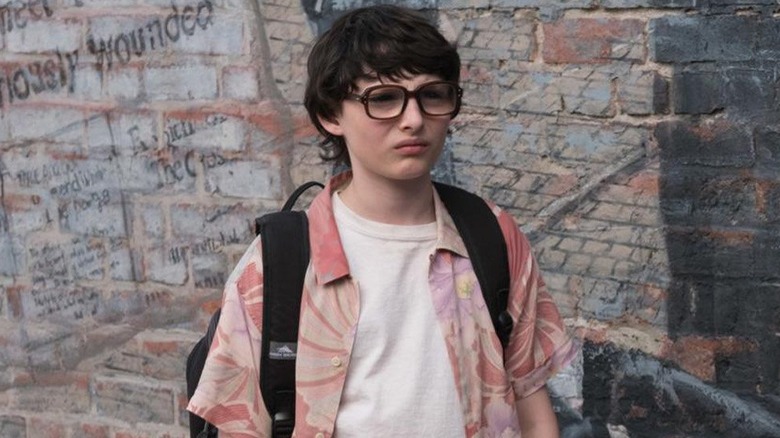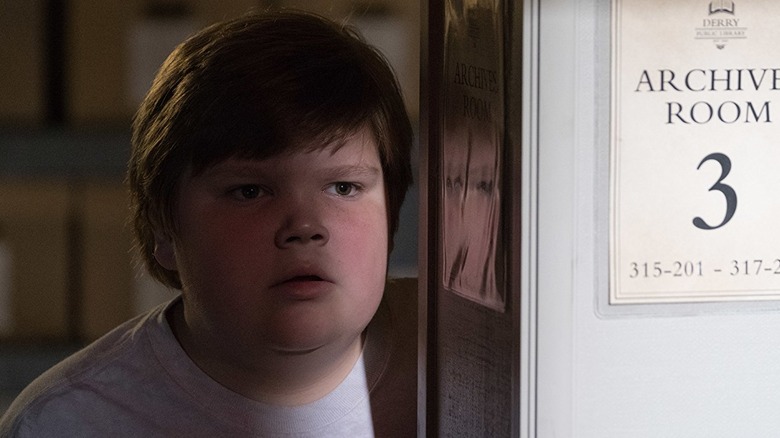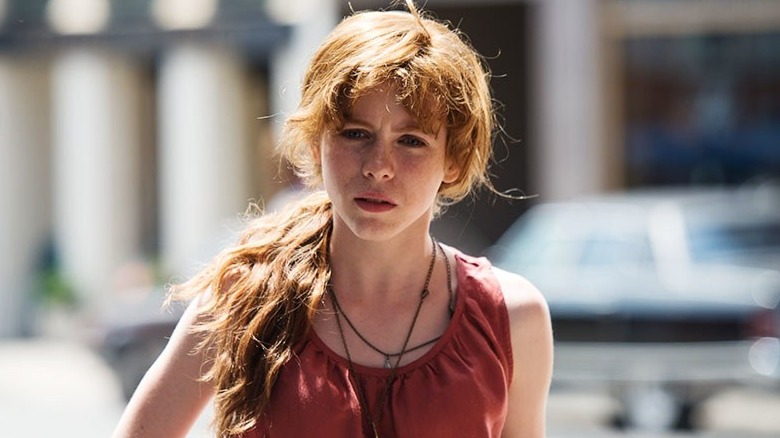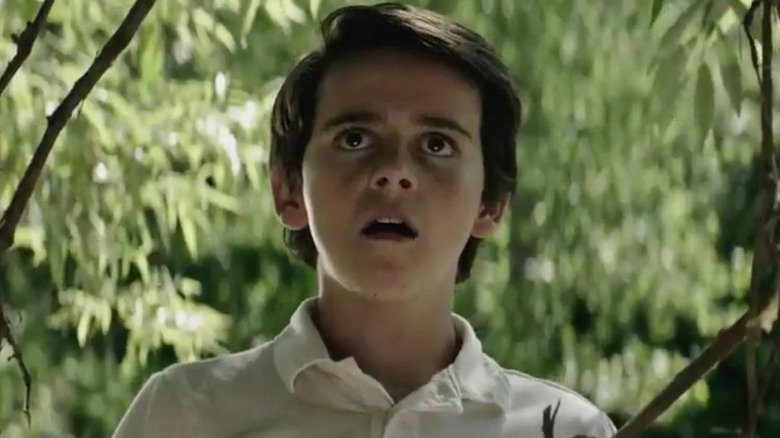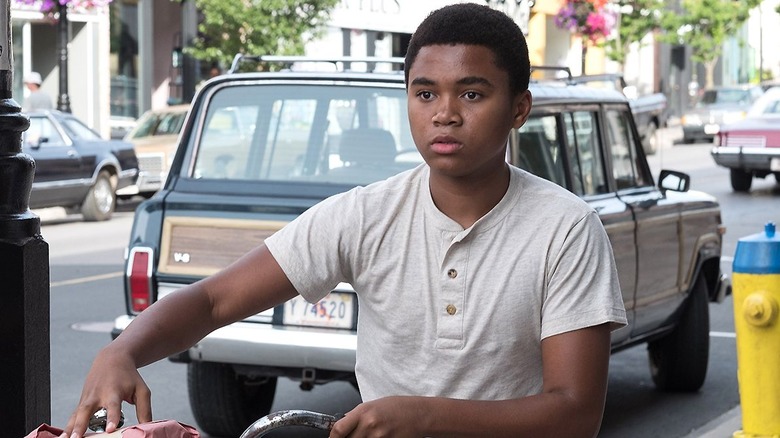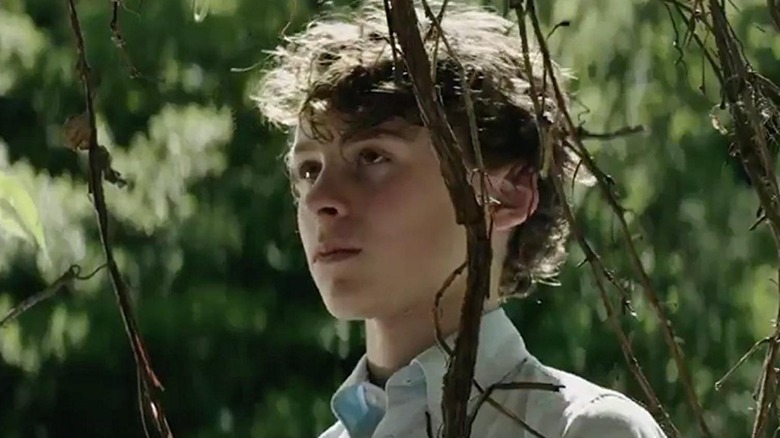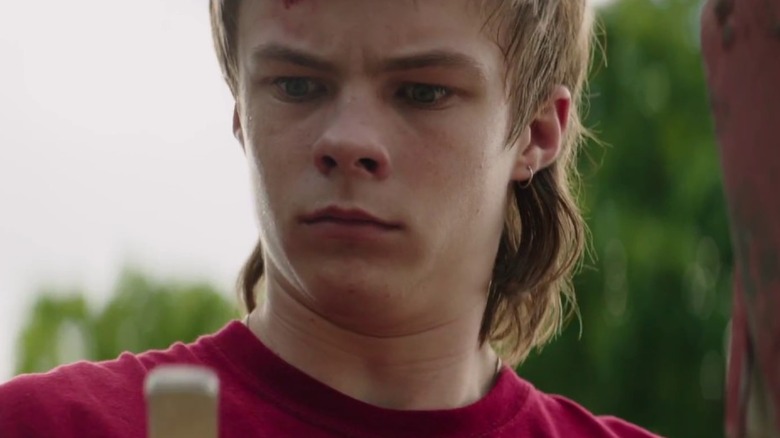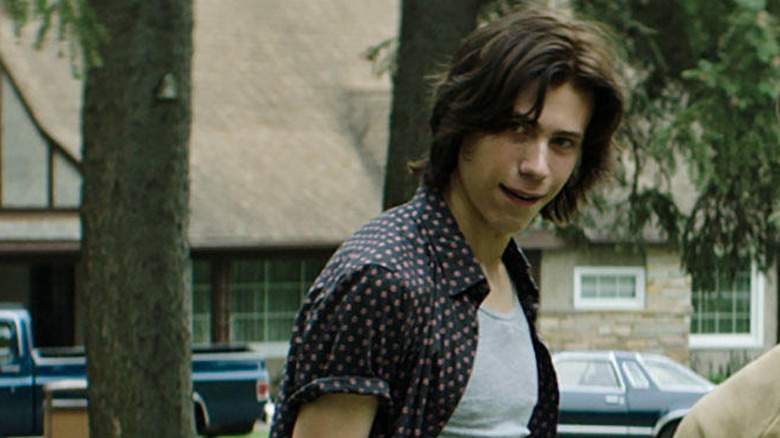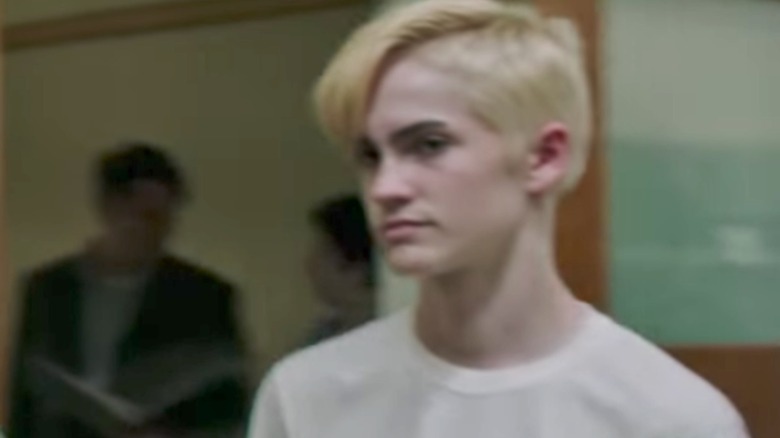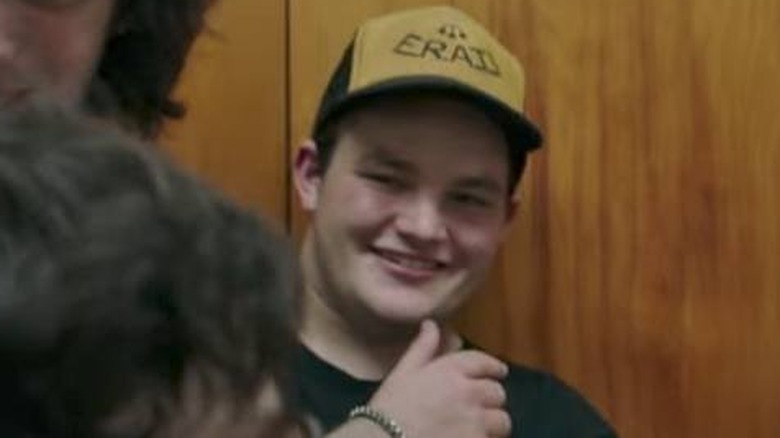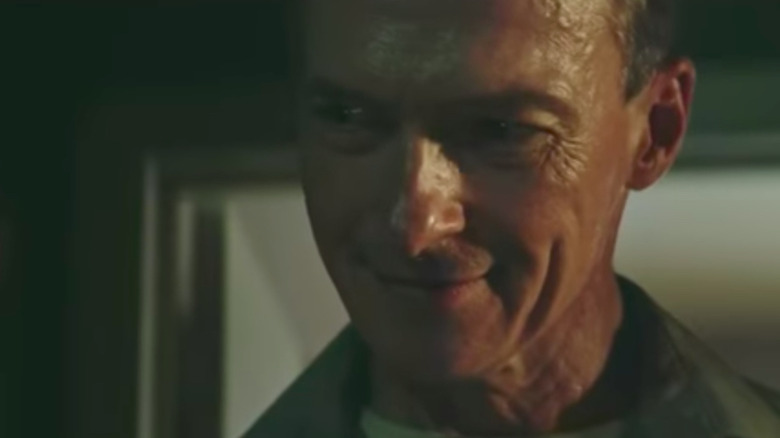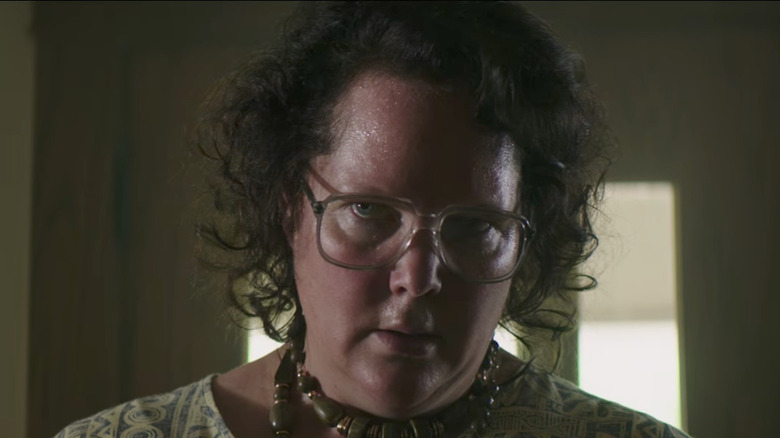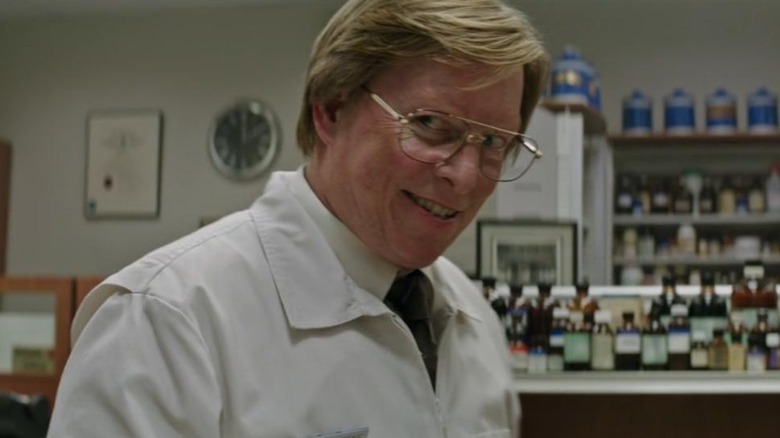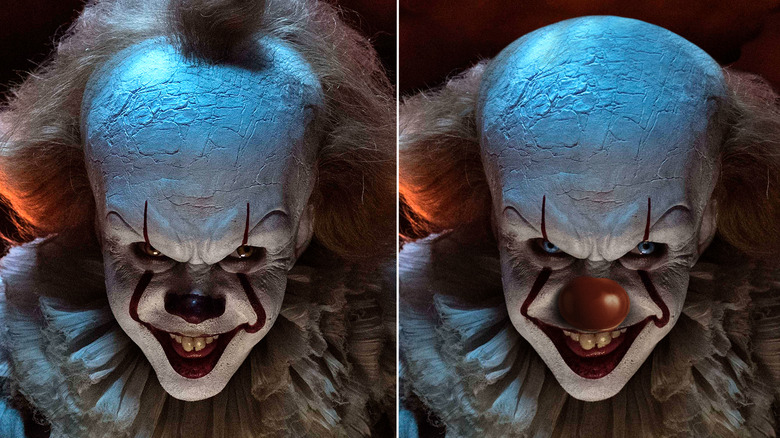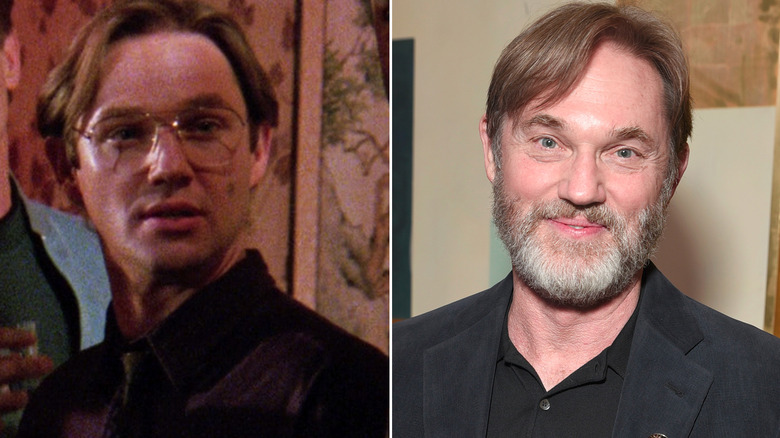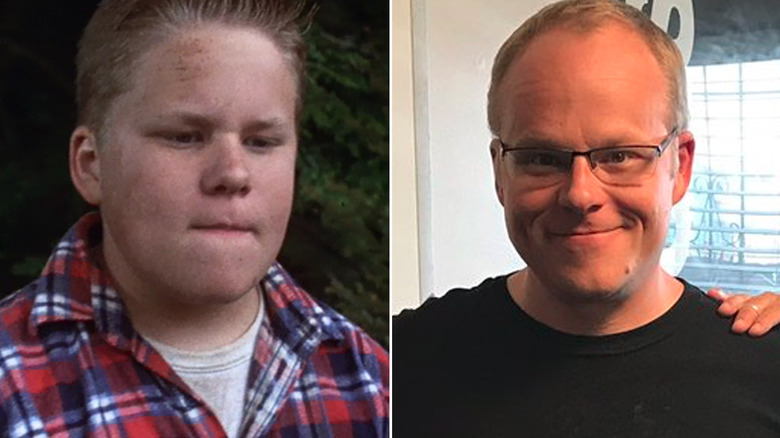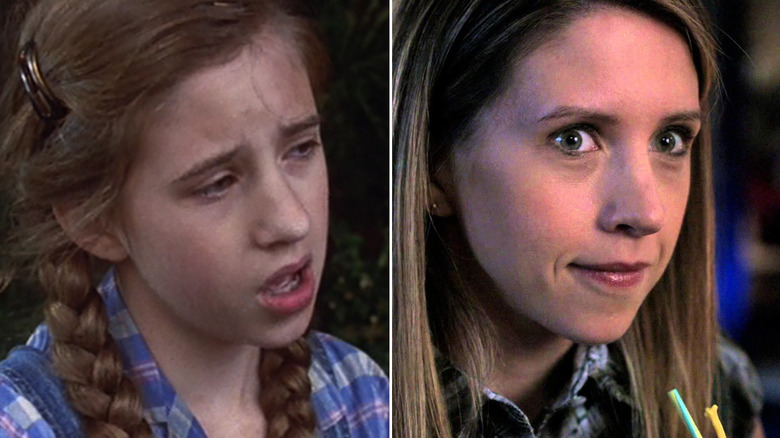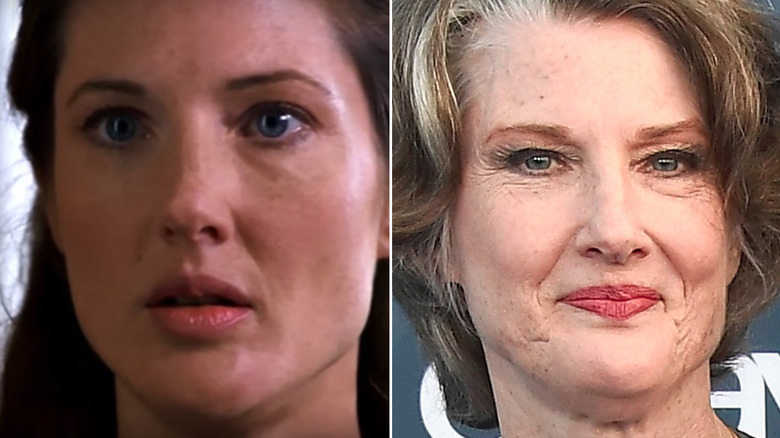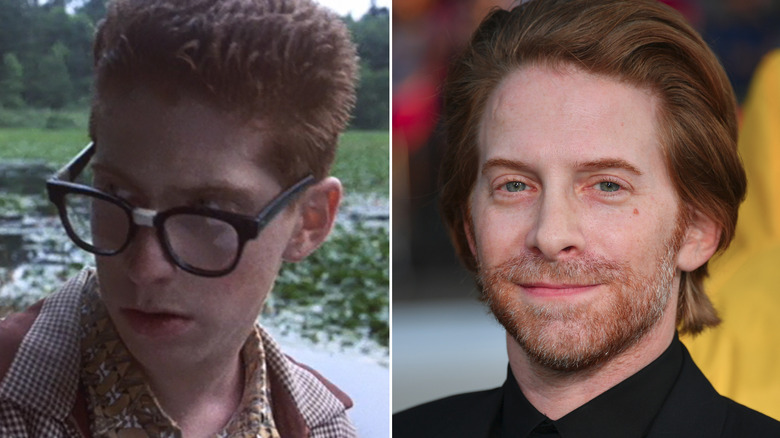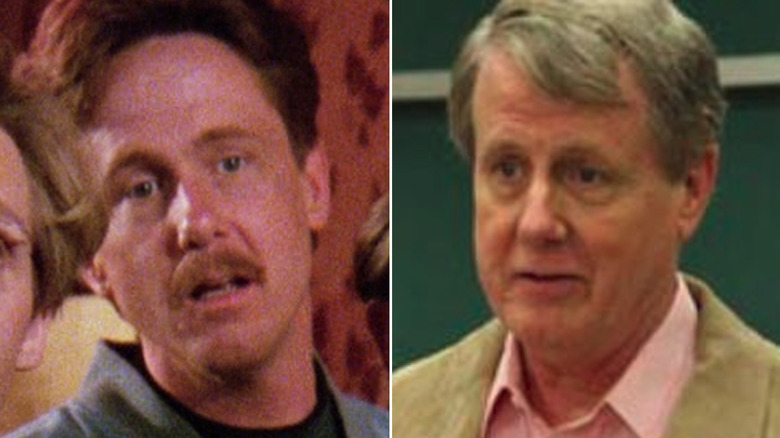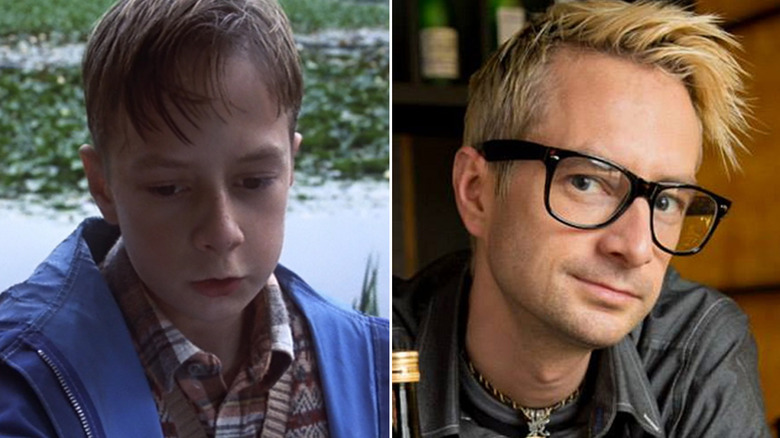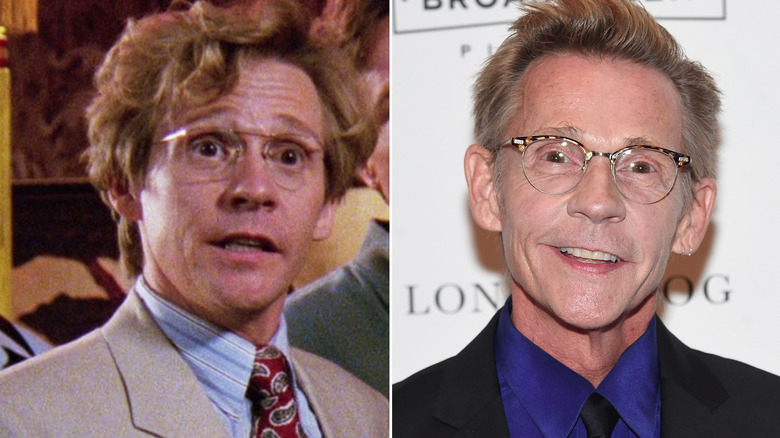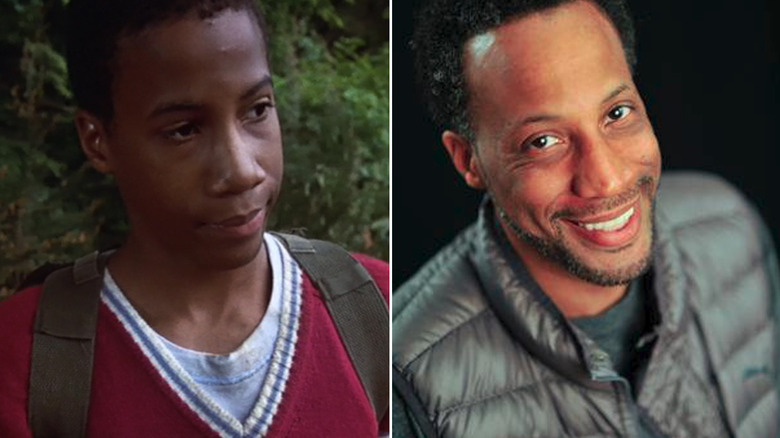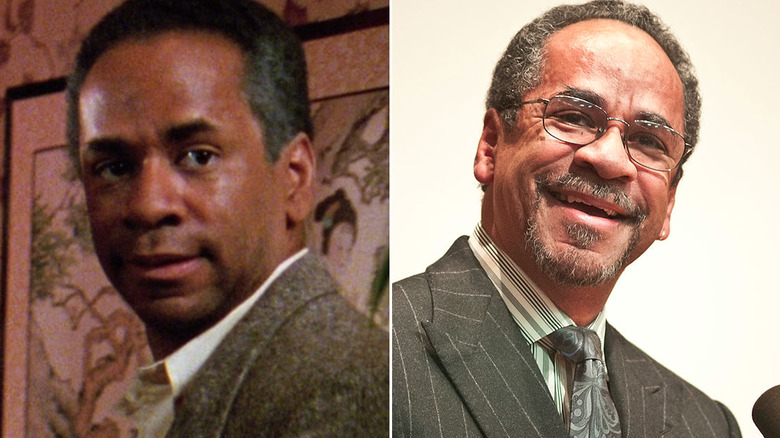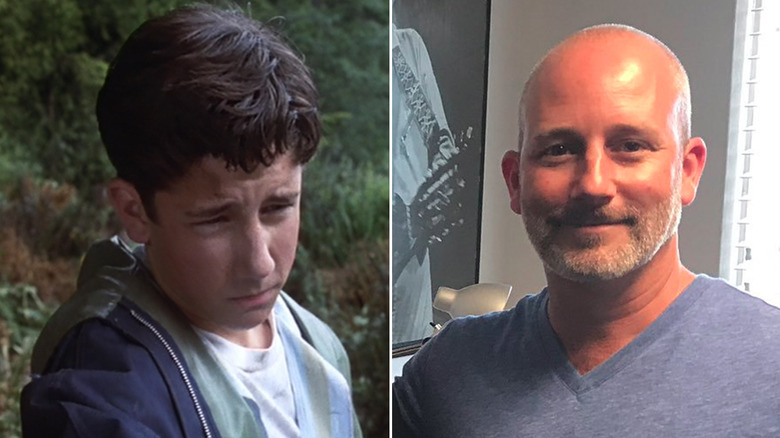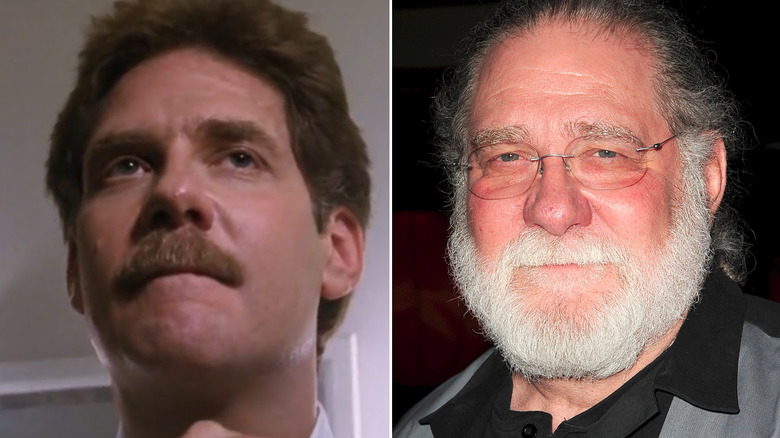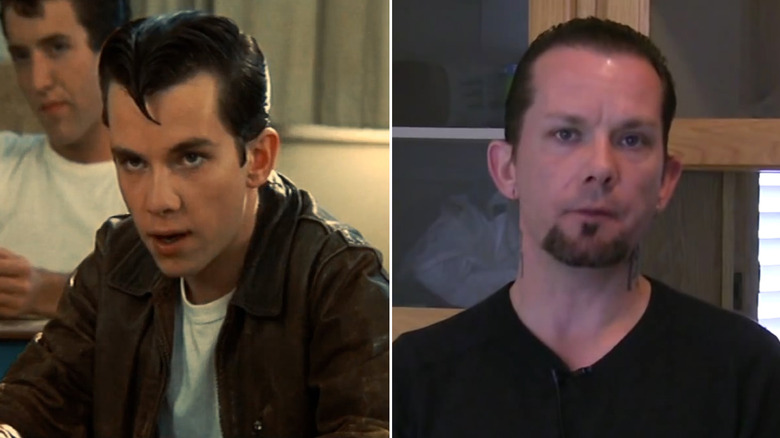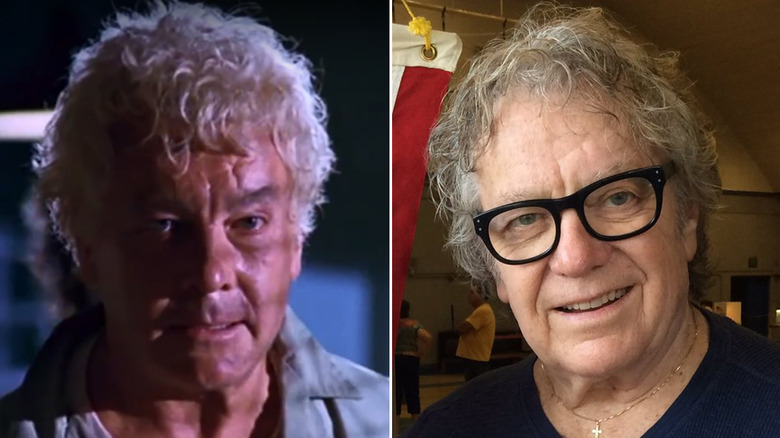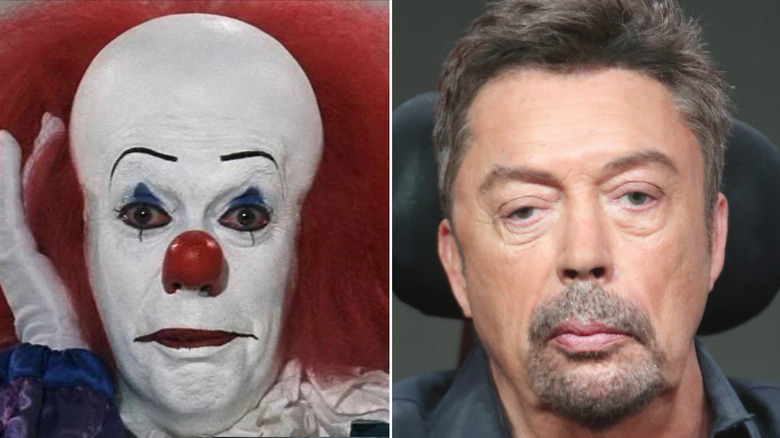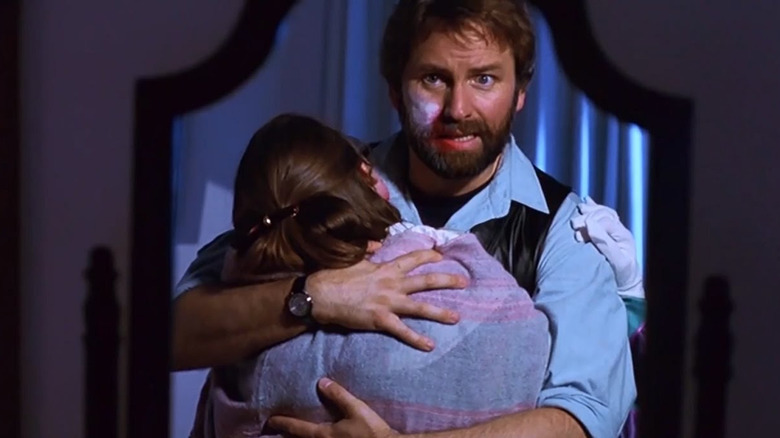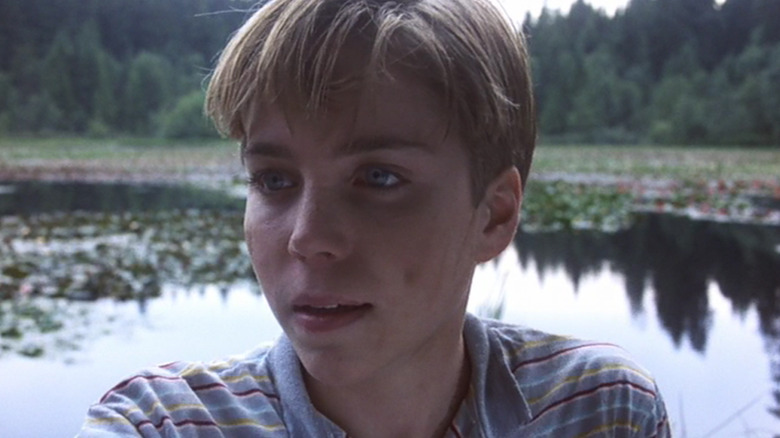How The Cast Of It Should Really Look
Stephen's King's 1986 novel It centers around a group of misfit kids dubbed the Losers' Club as they battle a supernatural evil tormenting their town of Derry, Maine. Tormented by school bullies, pitied by adults, and brought together by the fact none of them quite fit in anywhere else, King's young heroes faces one of the most malevolent forces on Earth—and with the 2017 film adaptation scoring big at the box office, we've decided to take a look at just how well the cast lines up with the way the characters are described in the book.
Bill Denbrough
Relative newcomer Jaeden Lieberher (previously seen in Midnight Special and Showtime's Masters of Sex) was tapped to play one of the first characters we meet in the book. Bill—also known as Stuttering Bill—is the de facto leader of the Losers' Club and older brother to Georgie, one of It's victims.
We get a brief description of Bill when he's seized with a coughing fit during a bout of the flu, and his face turns as red as his hair. Later, when he races to the drugstore on his bike, Silver, to get his friend Eddie Kaspbrak's asthma medicine, we read about the "goofball grin" he has when he's riding Silver, as well as the anxious blue eyes that meet the pharmacist. That same pharmacist also thinks there's no way Bill's actually big, tall, or strong enough to successfully ride his bike.
When Mike Hanlon is running from Henry Bowers and comes face to face with the Losers Club, he talks to Bill first because he's described as the leader and the tallest, most authoritative figure in the group. After the group's childhood years, an adult Richie Tozier would later see someone who reminded him of Bill: a teenage JFK.
Onscreen, Lieberher looks little like the Bill described in the book. He's not particularly taller or more imposing than the others, but he still makes it clear he's the one who's lost the most—and has the most at stake down in the sewers. He doesn't have Bill's shock of red hair, either, but he definitely has Bill's presence and his heart.
Richie Tozier
This Stranger Things alumni is definitely no stranger to weird things that go bump in the night—or 1980s period projects. As Richie Tozier, Finn Wolfhard plays a scrawny, spectacled kid with a number of nicknames, but it's his oversized front teeth that gave him the less-than-flattering "Bucky Beaver." Without his glasses—so thick they magnify his eyes into an expression of constant surprise—he'd be virtually blind.
Those glasses are constantly being broken, dropped, kicked, and bent, and they're almost always lopsided and mended with tape. Richie's appearance is always slightly awkward, characterized by the front teeth that gave him his nickname, and his vocal impressions (all of which sort of sound like Richie Tozier). His mouth constantly gets him into trouble—hence his other nickname, Trashmouth.
Most of the book's physical descriptions of Richie revolve around his glasses and his teeth, and Wolfhand definitely pulls off the glasses and his character's wide-eyed awkwardness. King left a lot of room to play with Richie, and Wolfhard's casting was nothing short of perfect—his attitude is 100 percent Trashmouth.
Ben Hanscom
Relative newcomer Jeremy Ray Taylor may be familiar to fans of the Marvel Universe thanks to his role as a bully in Ant-Man. In It, he made a change of pace by playing Ben Hanscom, the boy all the grown-ups like.
When it comes to wardrobe, Ben's childhood choice of clothes doesn't just say a lot about what he looks like, but who he is. He wears only one of four baggy sweatshirts because after being ridiculed for wearing an Ivy League shirt, he decided that it was safer for an overweight kid to stick with clothes he can hide behind. Just as important to his appearance is the way he carries himself, which makes him popular with adults—and disliked by a lot of kids. He's soft-spoken and shy, polite and sensitive.
Most of the descriptions of Ben revolve around his weight, and it's what everyone his own age—especially Henry Bowers, whose gang bullies the Losers' Club—sees when they look at him. When the two groups get into a rock fight, Ben tackles Henry; when he does, we find out he's "one hundred fifty trying for one-sixty." He also bears a scar from the time Henry started to carve his name into Ben's stomach—and another from one of the Club's encounters with It.
Taylor is spot-on—it's as if the character stepped off the page and onto the screen. It's easy to imagine casting directors taking one look at him and saying, "That's our Ben."
Beverly Marsh
Beverly Marsh, played by Sophia Lillis in her first major role, is the only girl in the Losers' Club. Like Ben, Bev's clothes aren't just a part of her look, they're a part of her character. When Ben sees her in class, he admits to himself even in Salvation Army thrift-store sweaters, too-big skirts, and scuffed penny loafers, she's still prettier than the most well-to-do girls of their class.
We get a better picture of her when Ben and Bev run into each other just after school lets out for the year. She's described with all the details of a schoolboy crush: her hair is long and auburn, eyes are gray-green, her skin "milky." Richie runs into her later, and even though he admits to himself she's the prettiest girl he's ever seen, he also likes her because "she was a good guy."
Richie describes Bev's hair as having "highlights seeming coppery or sometimes almost blonde," reaching to her shoulder blades. She has a bruise on her cheek at the time (not an uncommon reminder of her father's tendency toward violence), and it stands out on her pale complexion, smattering of freckles, red lips, and what he describes as gray-blue eyes. He also notices something else—a smile he sees as "wise, cynical, and sad all at the same time."
Lillis's casting is essentially perfect. She has the same complexion and reddish-blonde hair as her novel counterpart, and she doesn't just pull off the look (slightly updated for the 1980s), but has a world-weary cynicism that makes her seem much older than she is, a product of her environment.
Eddie Kaspbrak
Jack Dylan Grazer capped a brief string of early supporting roles with the part of Eddie Kaspbrak, one of Bill's longtime closest friends and a charter member of the Losers' Club.
Most of King's descriptions of Eddie center around his asthma. Plagued by an ever-present mother convinced he's going to hurt himself and die, he's small, slight, and fragile—even as an adult, when his face is described as "thin and delicate-looking." It's early on, when we get a look into the adult Eddie's medicine cabinet, that we get the most general description of a short, shy man with a white, rabbit-like face, and wide, staring eyes. Those gray eyes are mentioned elsewhere in the book when he confronts his mother about whether she knew his inhaler was only filled with water—one of the only times he manages to stand up to her.
Grazer's Eddie doesn't get much of a description in the book, so there weren't many ways they could go wrong. Grazer captures his character's mother-inflicted frailties while still being a lot stronger than he looks—exactly as Eddie should be.
Mike Hanlon
Hawaii Five-O vet Chosen Jacobs traded the tropics for Maine when he took on the role of It's Mike Hanlon. A farm kid growing up on the outskirts of town, Mike is from the only black family in Derry, and that's made him one of Henry's favorite Losers' Club targets even though they don't go to the same school.
Working in the fields has made Mike tough, and he's the one who ultimately stays behind in Derry, waiting for It to return after the others move away. He's described as incredibly fast, agile, and slim, escaping countless beatings simply by outrunning and outmaneuvering Bowers and his gang. He's athletic and strong, going on to briefly play football until he's sidelined by an injury.
Jacobs was a brilliant casting choice for Mike. He's the big, tough, farm kid, but still has an emotional vulnerability that sends him running from Bowers and his crew. We got to see him grow up, and fans who know what happens to adult Mike know young Mike set it up perfectly.
Stan Uris
Wyatt Oleff played the young Star-Lord in the Guardians of the Galaxy movies before being cast as It's Stan Uris, a boy who earns his outsider status because of his faith—and because he's a grade behind, having started late since he was a sickly kid. According to Eddie, the stereotypes everyone's heard about Jews don't hold up for Stan, because he's "got a regular nose and he's always broke."
Stan is described as the fastidious sort, and the kind of person who never needed to be told to keep the hood of his raincoat up. That extended to every bit of his life, from his clothes to his studies to his appearance. His black hair is mentioned when he's first introduced as an adult; in retrospect, Eddie remembers that as a child, Stan had a sort of inherent grace.
Oleff doesn't look too much like the Stan in the book—he doesn't have black hair, the feature that's mentioned most often. But he does have Stan's fussy mannerisms down, and his neatness is as much a part of him as his physical description.
Henry Bowers
Nicholas Hamilton plays school bully Henry Bowers, who's a little older than the members of the Losers' Club even though he's in the same grade. He's 12 but big for his age, made into something of a brute by a supposedly crazy father who made him work nearly the equivalent of a full-time job doing heavy farm labor.
Unlike the film, which moves the action to the '80s, the book is set in the '50s—and Henry is the embodiment of the 1950s bully, with a flat top haircut, kept short enough that it's as much scalp as hair. He goes heavy on the Butch-Wax, and "as a result the hair just above his forehead looked like the teeth of an oncoming power-mower." He smelled of sweat and Juicy Fruit, and wore a pink motorcycle jacket with an eagle on the back. His eyes are black, and he's often covered with bruises, reminders of beatings handed out by his dad.
Hamilton's Bowers got a massive update for the movie, so he's missing a lot of what made the Henry Bowers of the book. He's lost his jacket, but the character still manages to keep an almost 1950s feel while still looking completely at home in the '80s. Hamilton embodies the dangerous insanity that made Bowers the perfect pawn for It, and he doesn't need a pink jacket to do it.
Patrick Hockstetter
Henry Bowers and his crew were bullies, but it was Patrick who was really, truly horrible. Played by Owen Teague from Bloodline and Black Mirror, Patrick is the student who triggered a whole different level of fear in those he terrorized with his wandering hands and pencil case full of dead flies. In the novel, he's heavyset—Bev describes him as "podgy." With his "slack and pallid moonface" and low-normal IQ scores, the adults underestimate just how clever he is—and how sick.
The most telling physical description we get is from Patrick's teachers, who think of him as "a big lump of clay that had been crudely fashioned to look like a boy." That's less than specific, but it gets the point across.
Teague, who already has a slew of credits to his name, looks nothing like the heavyset, expressionless 12-year-old of the book. Fans might be more inclined to think he'd be cast as Victor instead, but the essence of the character—his sick, twisted nature—is still very much there, even if his appearance and storyline has changed drastically.
Victor Criss
Victor Criss is just as 1950s-era bad boy as Henry, and his book look is very much a product of his era. Newcomer Logan Thompson looks next to nothing like the Victor of the book, and that's not surprising. Victor channels Elvis for his look, described as sporting a pompadour greased back with Brylcreem. His style is all motorcycle, and he's always wearing jeans, a shirt with a popped collar, and heavy engineer's boots... all the better for kicking.
Taking Victor from the page and the screen meant overhauling the character from an Elvis-inspired bully to something more at home in the 1980s, so it's not surprising Thompson doesn't look much like readers may have pictured. He does, however, look like the bullies every '80s kid remembers from school.
Belch Huggins
Belch is the biggest of Bowers' almost interchangeable thugs, but aside from that, Jake Sim's novel counterpart doesn't get much of a physical description. When Ben first sees him, he's mainly described as a looming sort of threat. Later, adult Eddie's memories are of a 12-year-old who was already adult-sized at six feet tall, weighing in around 170, and still growing. Given the nickname for obvious reasons—undoubtedly the height of child humor—he's big without being fat. He's terrifying, graceless, clumsy and angry.
Since most of Belch's descriptions focus on his size, it's safe to say Sim fits the bill. He's scary in a way that will bring back memories for adults in the audience, and it's easy to see why the Losers are terrified of him.
Mr. Marsh
When it comes to creepy, Alvin Marsh comes in a close second to Pennywise himself. Beverly's father is overbearing, physically abusive, and—in both the movie and book—potentially sexually abusive, too.
When the Marsh bathroom is drenched in blood, he comes running to her screams. He's described in the book as a big guy, balding, but with a bit of hair the same color as hers. He definitely doesn't smoke, definitely doesn't drink, and he's usually wearing his work clothes—gray pants and a gray shirt, the uniform of a janitor at the Derry Home Hospital. She says later he has a particular posture she identifies with him: "bent slightly forward, hands plunged deep [...] into his pockets". Bev's often on the receiving end of an unsettling blue stare, and says his eyes look out from a basset-hound face.
The film's Mr. Marsh is Stephen Bogaert, and with a list of acting credits dating back to the mid-1990s (featuring films like X-Men: Apocalypse and American Psycho) you know his face. It's not really the face described in the novel version of It, though. He's absolutely not the big-boned, jowly man readers picture, he's not balding, and he's not particularly red-headed, but given how well he does a creepy sort of dangerous, the physical miscast can be completely forgiven.
Sonia Kaspbrak
Readers piece together a description of Eddie's overbearing mother from the moment we meet adult Eddie's wife, Myra. Eddie remembers putting a photo of his mother alongside his prospective bride, and being struck by the uncanny resemblance. Most of the description comes from seeing each woman gain more and more weight, and Sonia Kaspbrak was 406 pounds when she died. Eddie sees his mother in Myra's pale, plump face and pink, plump hands, and when he's young, he sees his mother most clearly through the pain of his broken arm. He sees tiny eyes in "pockets of flesh" and how she's incredibly pale save the red of her heavy rouge.
Eddie's belief in his asthma and in his medicine is a key part of the story, and in the movie, it's all set up by a Sonia Kaspbrak played by Mollie Jane Atkinson in a completely timeless track suit. Eddie's mother is described as a physical force of nature as much as anything, and while you could argue that Atkinson's Sonia isn't quite as big as her novel counterpart, she's 100 percent the shiny-faced, perpetually worried mom that shapes her son's hypochondria into something almost life-saving.
Mr. Keene
Mr. Keene the pharmacist is, as far as Eddie and his mother are concerned, their lifeline to continued health. When Bill rides to the pharmacy to get a refill on Eddie's inhaler, he's too distracted to give much in the way of a description, aside from saying Mr. Keene wasn't necessarily the nicest man, but he wasn't mean, either. Later, when Eddie's invited behind the counter to chat with him about what's really in that inhaler, Mr. Keene says his wife tells him he doesn't need to watch his weight, and that he looks like "a stuffed string." His eyes twinkled, but it's not a nice look—more like "sun shining on mica in the desert." Eddie notices his gold-rimmed glasses, his bony fingers, liver-spotted hands, and his incessant dry smile.
He's played by Joe Bostick, and you might recognize him from Hemlock Grove. While he's just as squirrely as the Mr. Keene of the novel, he's nowhere near as gaunt or as aged as he's described. He's definitely got the predatory grin down to perfection, but otherwise this casting is a solid miss as far as sticking to the book is concerned.
Pennywise
As we've helped illustrate with some Photoshop work in the above image, Bill Skarsgård's Pennywise represents a change from the novel. According to costume designer Janie Bryant, the new look was inspired by a combination of Renaissance, Elizabethan and medieval-era clown and jester costumes, all with a Victorian feel.
But in the book, the first time we see Pennywise is through the eyes of Bill's little brother, Georgie Denbrough, who sees yellow eyes—"the sort of eyes he had always imagined but never actually seen down in the basement." Since Georgie's operating on 1958 pop culture references, he likens the clown—who introduces himself as Mr. Bob Gray, or Pennywise the Dancing Clown—to a mix of Bozo and Clarabell. As the book notes, if Georgie'd been born a bit later, he would have thought of Ronald McDonald.
His face is painted white, and he's bald save for a tuft of hair on each side of his head—described as more orange than red. He's got a big clown smile painted on, and once he starts talking, Georgie realizes his eyes aren't yellow at all, they're blue. He's wearing something a baggy silk suit with orange buttons, a giant, electric-blue tie, and white gloves that remind the doomed Georgie of Mickey Mouse.
The Pennywise of the movie looks little like King originally imagined—he's less of a Bozo than a terrifying jester ripped from the darkest parts of history. He's a completely different sort of clown, but it works so, so well even the most dedicated purists will forgive these changes.
And now that we've compared the cast of the 2017 It movie against Stephen King's descriptions of the characters in the book, let's take a look at the stars of the TV miniseries adaptation that aired in 1990, exploring what they've been up to since—and what they look like today.
Richard Thomas (Bill Denbrough)
You may remember him better as "John-Boy" in the The Waltons, or from his role as a German World War I soldier in the 1979 television movie All Quiet on the Western Front, but for horror fans, Richard Thomas will always be remembered as the adult Bill Denbrough in the 1990 version of It.
After It, Thomas continued his prolific acting career with more TV series, television movies, and a few feature films. You might have spotted him in The Adventures of Swiss Family Robinson, Wonder Boys, The Americans, or Just Cause. Thomas also has an active presence on the stage, and received a Tony Award nomination for his role in the 2017 Broadway revival of the classic play The Little Foxes.
Brandon Crane (Young Ben Hanscom)
In the 1990 miniseries, Brandon Crane played the young version of Ben Hanscom, who was frequently bullied by Henry Bowers and his gang because of his weight. Around the same time, Crane also had a recurring role on the classic drama-comedy series The Wonder Years as Kevin's close friend Doug Porter.
Following his appearance in It, Crane had a couple of television roles in 1991, including Backfield in Motion and Step by Step. According to his IMDb page, Crane has only appeared in two short films since, the most recent one arriving in 2004. These days, Crane makes his living as a stage actor, singer, and front-end website developer. During the summer of 2017, Crane reunited with some of his It co-stars for the filming of an upcoming documentary, Pennywise: The Story of 'IT.'
Emily Perkins (Young Beverly Marsh)
Young Beverly Marsh is forced to overcome a lot of difficult situations in her life—in addition to the threat posed by the evil inter-dimensional being terrorizing her small Maine town. Canadian actress Emily Perkins portrayed the young version of Beverly in the 1990 It miniseries, which was one of her first major roles. After It, Perkins would go on to appear in other television shows and movies like Mom P.I., The X-Files, In Cold Blood, the Ginger Snaps film franchise, and the Christy film franchise. More recently, you may have spotted her in the TV shows Da Vinci's Inquest, Supernatural, or Hiccups.
Annette O'Toole (Beverly Marsh)
Before she became the adult Beverly Marsh in It, Annette O'Toole started a long association with the Man of Steel with her appearance as Clark Kent's love interest Lana Lang in the 1983 film Superman III. Following her stint in It, O'Toole continued her acting career—and returned to the Superman universe in a very different role. From 2001 to 2011, O'Toole starred in the Smallville series as Clark Kent's adoptive mother, Martha. In addition, O'Toole has appeared in many other films and TV shows, including Nash Bridges, The Huntress, Halt and Catch Fire, and 11.22.63—in which she returned to the world of Stephen King when she played a boardinghouse owner.
Seth Green (Young Richie Tozier)
Long before he became a household name, Seth Green was the foul-mouthed wisecracking 12-year-old Richie Tozier in the 1990 It miniseries. In the prologue to the series, it's revealed that Richie was later cast in a Hollywood film—a future that would mirror Green's own. Following It, he rose to fame with roles in popular commercials, the Austin Powers film franchise, the television series Buffy the Vampire Slayer, the heist movie The Italian Job, and many more.
Green is also known for his voiceover work in dozens of film and television shows; you may remember him best as the voice of Chris Griffin in the animated comedy series Family Guy. He also provides many of the voices on the Adult Swim sketch comedy stop-motion-animated series Robot Chicken—a show he also created, produces, writes, and directs for.
Harry Anderson (Richie Tozier)
For the 1990 It miniseries, the young Richie Tozier played by Seth Green came back as an adult in the form of actor/magician/comedian Harry Anderson. Anderson is likely better known for his long-running role as Judge Harry Stone in the NBC sitcom Night Court, which first aired in 1984. Following It, Anderson continued in his role on Night Court until the series ended in 1992, and then he went on to appear in other TV shows like Cheers and Hearts Afire—in which he reunited with his It co-star John Ritter for an episode.
From 1993 to 1997, Anderson starred as the title character in the CBS sitcom Dave's World, after which he has only had a few film and TV credits on his IMDb page. Anderson also owned a nightclub in New Orleans for several years, which he and his wife sold in 2006 when they moved to Asheville, North Carolina. These days, he's returned to his roots, performing stand-up and magic shows at venues around the country.
Adam Faraizl (Young Eddie Kaspbrak)
Twelve-year-old Eddie Kaspbrak was the most timid member of the Losers' Club, frequently jumping at his own shadow or complaining of ailments (like asthma) that his mother convinced him he suffered from. Playing Eddie in the 1990 miniseries was Adam Faraizl, who didn't stick with acting for long after It premiered. He made a handful of appearances in TV movies in 1991 and 1992, with a part in the direct-to-video Where the Red Fern Grows: Part Two as his last credited role.
Later, according to his LinkedIn page, Faraizl attended the University of Victoria in British Columbia, getting a degree in Pacific & Asian studies. He then returned to Texas (where he'd attended high school) and began a career in the culinary field—eventually becoming the beverage director for the Kenichi sushi restaurant in Austin, TX, specializing in everything related to the Japanese rice wine known as sake. Faraizl now lives in the Seattle, Washington area, where he's the bar manager at the Red Cedar & Sage restaurant.
Dennis Christopher (Eddie Kaspbrak)
Playing the adult version of Eddie Kaspbrak in the It miniseries was Dennis Christopher, who first rose to prominence in Hollywood with his starring role as Dave in the 1979 film Breaking Away, about a young man and his friends who decide to put together their own cycling team to take on some well-trained competition in the annual Little 500 bicycle race. Christopher went on to appear in many more films and television shows over the years, including Murder, She Wrote, Star Trek: Enterprise, Profiler, Deadwood, and The Lost Room.
In 2012, Christopher experienced a career resurgence when Quentin Tarantino cast him as a lawyer to a plantation owner played by Leonardo DiCaprio in his revisionist Western drama Django Unchained. Most recently, he appeared in several episodes of the Epix comedy series Graves.
Marlon Taylor (Young Mike Hanlon)
Like Ben Hanscom, Mike Hanlon is frequently targeted for bullying by Henry Bowers and the rest of his gang. With a strong interest in history, Mike helps the rest of the Losers' Club by providing information about the bloody history of Derry—which leads them to connect the dots between these incidents and the reappearance of the entity known as "It."
Playing a young Mike Hanlon was actor Marlon Taylor, who also appeared in a handful of other television roles as a child, including You Take the Kids and Sister, Sister. After 1994, Taylor took a hiatus from acting, but reappeared in 2009 when he co-starred in the rap drama Know Thy Enemy. Information about what he's been up to since then is scarce, but according to Taylor's Twitter account, he recently finished filming a part for an episode in season four of Syfy's post-apocalyptic TV series Z-Nation.
Tim Reid (Mike Hanlon)
Taking over for Mark Taylor as the adult Mike Hanlon in the 1990 It miniseries, Tim Reid played out the rest of Mike's tale for viewers, as he discovers that It has returned 27 years after their last encounter. He calls upon the rest of the Losers' Club to return to Derry in order to honor their blood oath and face the evil that threatens the town.
Like his younger Mike counterpart Marlon Taylor, Tim Reid also appeared on the sitcom Sister, Sister, where he played a long-running role as the father of Tamera Mowry's character. You may also recognize Reid from his other major television roles on shows like WKRP in Cincinnati, Simon & Simon, or Frank's Place. Following It, Reid continued to act in a number of films and television shows, including That '70s Show, The Cost of Heaven, and Treme. Most recently, Reid made a couple of appearances as Bishop Lionel Jeffries in the Oprah Winfrey Network drama series Greenleaf.
Ben Heller (Young Stanley Uris)
Being an actor isn't for everyone, and it certainly seems that was the case for Ben Heller, who played the 12-year-old version of Stanley Uris in 1990. Stan is the most logical (and skeptical) of the Losers' Club members, casting doubt on whether It even exists until he finally sees the undeniable proof. According to IMDb, Ben Heller's appearance in It was his first and only acting role.
Heller also seems to be a hard-to-track-down guy these days, so while we found a current photo of him (courtesy of his co-star Brandon Crane), we don't have any information on what he's been up to over the last 27 years. Hopefully Ben can help fill in the blanks for fans himself when he appears in the 2018 documentary about the making of the 1990 miniseries, Pennywise: The Story of 'IT.'
Richard Masur (Stanley Uris)
Although Stan was the one who initiated the blood oath between the Losers' Club members when they were children, when he learns from Mike that It has returned to terrorize Derry, his fear of facing the ancient evil again proves to be too much. After hanging up the phone with Mike, Stan tells his loving wife that he's going to take a bath—where she later finds him dead, his wrists slit and the word "It" scrawled in blood on the tile wall.
Because the adult Stanley's screen time was relatively short compared to the rest of the grown-up Losers' Club members, you might remember actor Richard Masur better from some of his other early roles in shows like Rhoda, East of Eden, and One Day at a Time, or for his part in the sci-fi/horror classic The Thing—which still gets Masur regular gigs at horror conventions today. After It, Masur continued his prolific film and TV career with dozens of roles in productions like Encino Man, Picket Fences, All My Children, The Good Wife, and Transparent. His most recent projects include his recurring part on the popular prison drama series Orange is the New Black, and roles in the upcoming films Before/During/After and Another Year Together.
Jarred Blancard (Young Henry Bowers)
Canadian actor Jarred Blancard played the teenaged bully Henry Bowers in the 1990 It miniseries—a character whose favorite pastimes include torturing the members of the Losers' Club and trying to look cool with his greased-up hair, leather jacket, and switchblade. The disturbed Bowers later falls under the influence of It, falsely confessing to the murders committed by the entity and being sent to live out his days at the Juniper Hill Asylum.
Jarred Blancard continued acting through the '90s, and appeared in films and television shows like The Yearling, The Boys Club, and Ninja Turtles: The Next Mutation. He took a hiatus from acting after his 1999 role in The Crow: Stairway to Heaven, and in a Youtube video from 2012, he explains how he struggled with addiction as a young adult, which later prompted him to become an addiction recovery counselor in his native Vancouver—a position that he still held as of 2014.
Michael Cole (Henry Bowers)
Even locked up in the Juniper Hill Asylum, an adult Henry Bowers (played by Michael Cole) wasn't safe from It. The entity appears to him in the form of his deceased friend Belch Huggins, who gives Henry his switchblade back and convinces him to kill the asylum orderly and escape back to Derry in order to face the Losers' Club once more.
Because of the white hair required for the role and the passage of time, you may not have recognized Cole as Bowers, but you probably will remember him for his starring role as Pete Cochran in the hit crime drama The Mod Squad. Like his younger Henry Bowers counterpart Jarred Blancard, Cole also struggled with addiction and was treated for his alcoholism in the '90s. Cole continued to act after It, returning to the small screen with a part in an episode of the TV series 7th Heaven. He came back to the big screen a few years later, with a role in the 2000 film The Apostate. Cole has had a handful of other appearances since then, with his most recent one in the 2008 television movie Grave Misconduct. That isn't the last we'll seen of him, though—he's also slated to show up in the 2018 documentary, Pennywise: The Story of 'IT.'
Tim Curry (Pennywise)
Renowned actor Tim Curry did much of the heavy lifting in the 1990 It miniseries with his role as Pennywise the Dancing Clown—the most common alter ego used by It as it terrorizes Derry, Maine. While there has been considerable buzz surrounding Bill Skarsgård's take on the character in the 2017 film adaptation, there's no question that the new movie might never have been made without Curry's terrifying approach to the role. His dramatic turn as Pennywise helped popularize the "evil clown" archetype, which undoubtedly spawned a new generation of coulrophobes after the miniseries aired on primetime television.
Following It, Curry continued his extremely prolific acting career with dozens of roles in films, television shows, and as a voice actor in animated series. Even after suffering a stroke in 2012 which left him wheelchair-bound, Curry has barely slowed down: his recent roles include providing the voice of Darth Sidious in the animated series Star Wars: The Clone Wars from 2012 to 2014. In 2016, Curry returned to the world of The Rocky Horror Picture Show (he originated the part of Dr. Frank-N-Furter in the '70s) when he appeared as the Criminologist in the Fox TV remake of the classic musical.
John Ritter (Ben Hanscom)
The adult (and no longer overweight) Ben Hanscom was played by actor and comedian John Ritter in the 1990 adaptation. At the end of the miniseries, Ben and Beverly (Annette O'Toole) end up together, and a prologue reveals that they got married and were expecting their first child.
The Three's Company star continued adding roles to his long acting résumé following the premiere of It. He starred in the TV series Hearts Afire, and also in the Problem Child film franchise. Additionally, Ritter voiced the main character in the Clifford the Big Red Dog children's animated series, which earned him four Daytime Emmy Award nominations. He also appeared in films like 1996's Sling Blade and 2003's Manhood. Unfortunately, on September 11th, 2003, Ritter experienced cardiac problems on the set of 8 Simple Rules for Dating My Teenage Daughter, passing away later that day in the hospital. Ritter's final live-action film, Bad Santa, and a voice role in Clifford's Really Big Movie were both released after his death, and were both dedicated to his memory.
Jonathan Brandis (Young Bill Denbrough)
During the 1960s era of the It miniseries, Jonathan Brandis portrayed the young version of main protagonist Bill Denbrough, who's filled with grief and guilt after his little brother Georgie disappears while playing with a paper boat Bill made for him. Georgie was actually killed by Pennywise, a.k.a. It, which sets Bill and his friends in the Losers' Club on a mission to rid their town of this unspeakable evil.
Following It, Brandis continued his acting career and his climb to the top of the "teen heartthrob" list with appearances in films and television shows like The Neverending Story II, Sidekicks, Ladybugs, SeaQuest DSV, and Ride with the Devil. He hoped to halt a late '90s slump when he landed a role in the 2002 film Hart's War; unfortunately, many of his scenes ended up being cut for the theatrical release. Friends said he'd begun drinking heavily, and Brandis attempted suicide in November 2003. He was discovered and taken to Cedars-Sinai Medical Center, but sadly died of his injuries the next day.
